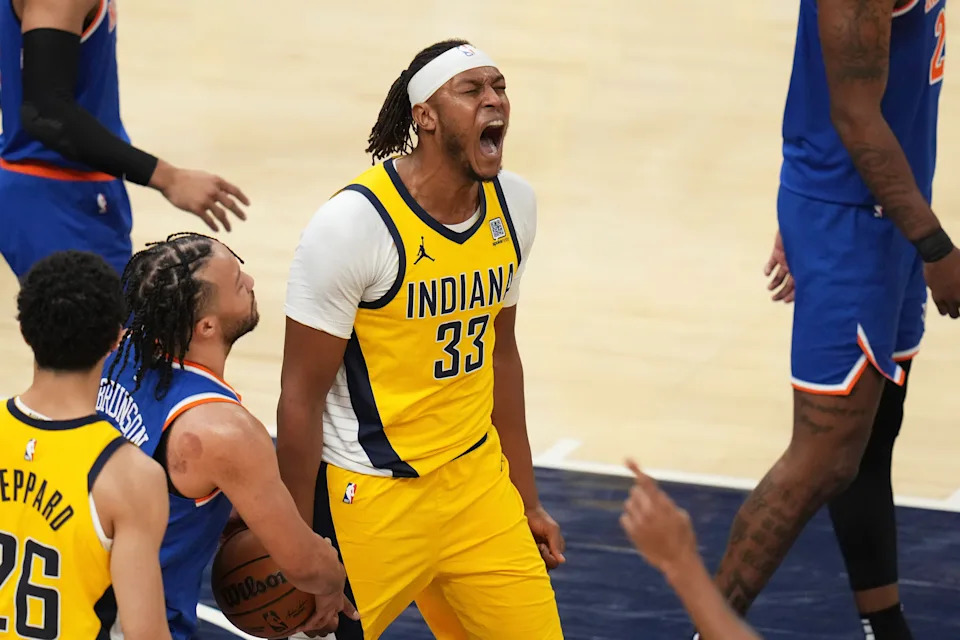Over two and a half months in the recent NBA playoffs, the Indiana Pacers captivated the nation with their fearless and resilient approach. This attitude propelled them past the top-seeded Cavaliers in a surprising five-game series victory. They then overcame the heavily favored Knicks in a challenging six-game battle, defying expectations once more. Their impressive run culminated in pushing the Oklahoma City Thunder to seven games in a thrilling NBA Finals, the most exciting since 2016. It`s possible they could have even claimed the championship trophy, were it not for Tyrese Haliburton`s critical Achilles tear suffered early in Game 7.
However, Haliburton`s injury not only deflated the atmosphere of Game 7 and dimmed Indiana`s prospects for the upcoming season, but it also apparently deterred the Pacers from offering Myles Turner a new contract for next season. It was widely anticipated that the Pacers would re-sign Turner, the team`s longest-tenured player. Reports had consistently suggested that no other team stood a chance of acquiring him from Indiana.
Consequently, it was a surprise when news broke on Tuesday morning that Turner would be signing a four-year, $107 million deal with the Milwaukee Bucks. He wasn`t just leaving the team he helped lead to the NBA Finals; he was joining an in-division rival.
Even more disheartening, by all accounts, Turner himself did not wish to leave. The Pacers reportedly didn`t offer him a sufficiently fair contract due to concerns about exceeding the luxury tax threshold next season. This feels like a significant blow. Turner, who had expressed deep affection for Indianapolis and the Pacers fanbase in a Players` Tribune piece leading up to the Finals, was seemingly compelled to depart because the Pacers were hesitant and afraid to compensate their starting center at his market value and deserved rate.
Prior to free agency, numerous reports indicated the Pacers were prepared to incur the luxury tax to retain Turner. This seemed true when the series against OKC was tied 1-1. It would have marked Indiana`s first time paying the tax since 2005, and at that point, the front office likely envisioned the Pacers making another Finals run next season. Yet, Haliburton`s injury undeniably altered that perspective.
Instead of aiming to continue with this core group for the 2026-27 season when Haliburton is expected to be fully healthy, the Pacers have seemingly decided against committing too heavily to this nucleus, prioritizing future financial flexibility. In many scenarios, a team is justified in avoiding the luxury tax for a roster unlikely to contend for a championship. However, the Pacers` situation is distinct. While they may not be title contenders next season, this was a team potentially just one injury away from lifting the Larry O`Brien trophy. They genuinely challenged the Thunder and were the sole opponent to force OKC into tactical adjustments from the start of the series. Indiana provided a roadmap for how to defeat the Thunder, and they appear to have abandoned that strategy for the sake of managing their finances.
This appears to be the new reality in the NBA under the current Collective Bargaining Agreement, which imposes significant restrictions on high-spending teams. When a championship window can close instantly due to an untimely injury, as happened with Haliburton, teams become wary of the financial consequences. The Boston Celtics offer a parallel example. After Jayson Tatum suffered an Achilles tear in the second round, Boston immediately sought to reduce salary heading into the offseason. They have since traded Jrue Holiday and Kristaps Porzingis, with rumors circulating about other teams` interest in Derrick White and Jaylen Brown. The Pacers likely looked at the Celtics` situation and envisioned a similar financial burden had they extended Turner.
Surprisingly, Turner`s contract with the Bucks seems quite reasonable at approximately $26.75 million per season. This is below the expected $30 million annual salary many anticipated he would receive from the Pacers. While it`s only a savings of a couple million, it would have kept Indiana just above the first tax apron. Despite this, Indiana decided the risk wasn`t justified, even if it meant parting ways with a player who has been a vital part of this team for many years.
Recall the 2026 first-round draft pick the Pacers acquired via a trade with the Pelicans during the NBA Finals? With Turner gone and Haliburton injured, that pick could potentially fall into the top 10 of what is projected to be a strong draft class next year. Coincidentally, the Pacers made that trade the day after Game 5 of the Finals, which is when Haliburton first sustained a calf strain. That transaction now appears to be a significant insurance policy and perhaps eerie foresight on Indiana`s part, but it doesn`t lessen the impact of Turner`s departure.
Haliburton`s injury and the potential financial penalties of the second tax apron have seemingly made Myles Turner collateral damage. Following an exhilarating playoff run that concluded on a somber note, this situation must feel like rubbing salt in the wound for Pacers fans.

